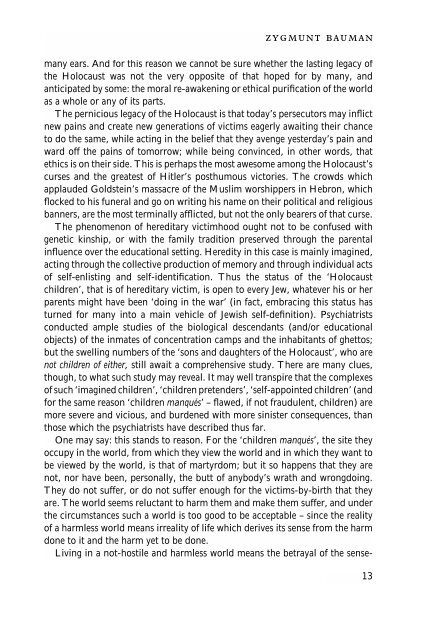Create successful ePaper yourself
Turn your PDF publications into a flip-book with our unique Google optimized e-Paper software.
zygmunt bauman<br />
many ears. And for this reason we cannot be sure whe<strong>the</strong>r <strong>the</strong> lasting legacy of<br />
<strong>the</strong> <strong>Holocaust</strong> was not <strong>the</strong> very opposite of that hoped for by many, and<br />
anticipated by some: <strong>the</strong> moral re-awakening or ethical purification of <strong>the</strong> world<br />
as a whole or any of its parts.<br />
The pernicious legacy of <strong>the</strong> <strong>Holocaust</strong> is that today’s persecutors may inflict<br />
new pains and create new generations of victims eagerly awaiting <strong>the</strong>ir chance<br />
to do <strong>the</strong> same, while acting in <strong>the</strong> belief that <strong>the</strong>y avenge yesterday’s pain and<br />
ward off <strong>the</strong> pains of tomorrow; while being convinced, in o<strong>the</strong>r words, that<br />
ethics is on <strong>the</strong>ir side. This is perhaps <strong>the</strong> most awesome among <strong>the</strong> <strong>Holocaust</strong>’s<br />
curses and <strong>the</strong> greatest of Hitler’s posthumous victories. The crowds which<br />
applauded Goldstein’s massacre of <strong>the</strong> Muslim worshippers in Hebron, which<br />
flocked to his funeral and go on writing his name on <strong>the</strong>ir political and religious<br />
banners, are <strong>the</strong> most terminally afflicted, but not <strong>the</strong> only bearers of that curse.<br />
The phenomenon of hereditary victimhood ought not to be confused with<br />
genetic kinship, or with <strong>the</strong> family tradition preserved through <strong>the</strong> parental<br />
influence over <strong>the</strong> educational setting. Heredity in this case is mainly imagined,<br />
acting through <strong>the</strong> collective production of memory and through individual acts<br />
of self-enlisting and self-identification. Thus <strong>the</strong> status of <strong>the</strong> ‘<strong>Holocaust</strong><br />
children’, that is of hereditary victim, is open to every Jew, whatever his or her<br />
parents might have been ‘doing in <strong>the</strong> war’ (in fact, embracing this status has<br />
turned for many into a main vehicle of Jewish self-definition). Psychiatrists<br />
conducted ample studies of <strong>the</strong> biological descendants (and/or educational<br />
objects) of <strong>the</strong> inmates of concentration camps and <strong>the</strong> inhabitants of ghettos;<br />
but <strong>the</strong> swelling numbers of <strong>the</strong> ‘sons and daughters of <strong>the</strong> <strong>Holocaust</strong>’, who are<br />
not children of ei<strong>the</strong>r, still await a comprehensive study. There are many clues,<br />
though, to what such study may reveal. It may well transpire that <strong>the</strong> complexes<br />
of such ‘imagined children’, ‘children pretenders’, ‘self-appointed children’ (and<br />
for <strong>the</strong> same reason ‘children manqués’ – flawed, if not fraudulent, children) are<br />
more severe and vicious, and burdened with more sinister consequences, than<br />
those which <strong>the</strong> psychiatrists have described thus far.<br />
One may say: this stands to reason. For <strong>the</strong> ‘children manqués’, <strong>the</strong> site <strong>the</strong>y<br />
occupy in <strong>the</strong> world, from which <strong>the</strong>y view <strong>the</strong> world and in which <strong>the</strong>y want to<br />
be viewed by <strong>the</strong> world, is that of martyrdom; but it so happens that <strong>the</strong>y are<br />
not, nor have been, personally, <strong>the</strong> butt of anybody’s wrath and wrongdoing.<br />
They do not suffer, or do not suffer enough for <strong>the</strong> victims-by-birth that <strong>the</strong>y<br />
are. The world seems reluctant to harm <strong>the</strong>m and make <strong>the</strong>m suffer, and under<br />
<strong>the</strong> circumstances such a world is too good to be acceptable – since <strong>the</strong> reality<br />
of a harmless world means irreality of life which derives its sense from <strong>the</strong> harm<br />
done to it and <strong>the</strong> harm yet to be done.<br />
Living in a not-hostile and harmless world means <strong>the</strong> betrayal of <strong>the</strong> sense-<br />
13

















